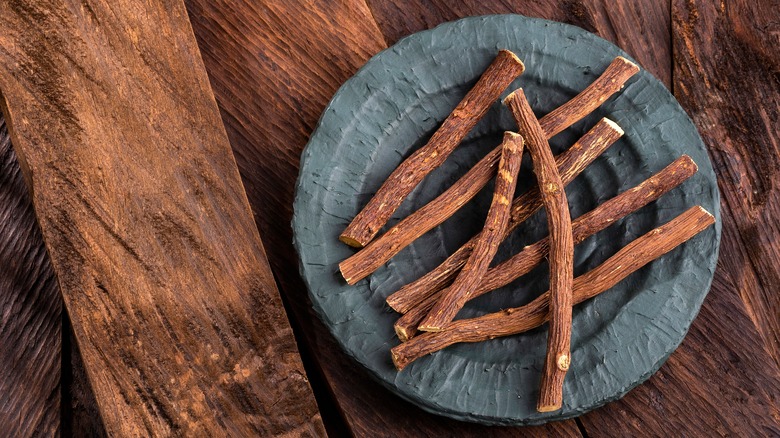Medications That Could Have Negative Interactions With Licorice
Licorice is an herb that is often used as a flavoring agent in candy, drinks, and tobacco products, says the National Center for Complementary and Integrative Health. It is grown throughout Asia, Europe, and the Middle East, but interestingly, what is sold as licorice in the United States often does not actually contain real licorice. Instead, it contains anise oil, which has a similar taste and smell.
Throughout history, licorice has been used as an herbal medicine for conditions like cough, ulcers, and swelling in the liver (per WebMD). Its use continues today, with WebMD stating that it is "possibly effective" for treating eczema, relieving canker sores, and preventing sore throat following the removal of a breathing tube.
Licorice derives its medicinal effects from a compound called glycyrrhizin, which Healthline reports as having potential anti-inflammatory and antioxidant effects on the human body. Like any medicine, however, licorice can cause side effects and interact negatively with other medications. It is important to speak with your doctor or pharmacist about any herbal medications that you are using, including licorice, so that they can help you avoid dangerous interactions.
Medications that might interact with licorice
According to WebMD, licorice can interact with drugs that affect potassium, such as loop diuretics. This may make the potassium in your blood become dangerously low. Low potassium levels can also increase the side effects of digoxin (Lanoxin).
Licorice may also decrease the effects of the anti-clotting medication warfarin (Coumadin). If you are taking licorice with warfarin, you may need a higher dose. In addition, it may decrease the effectiveness of the cancer drug cisplatin (Platinol-AQ). Licorice can further decrease the effects of certain other drugs, including midazolam (Versed) and paclitaxel (Abraxane, Onxol), by causing them to be broken down more quickly (per WebMD).
Corticosteroids and licorice don't mix well either. Drugs.com states that licorice slows their breakdown, which may increase the effects of any corticosteroid medications that you are taking. Medications that are altered in the liver by enzymes in the Cytochrome P450 pathway may also interact with licorice, according to a 2017 study published in the European Journal of Pharmaceutical Sciences. This can change how these medications affect your body.
Finally, WebMD writes that long-term consumption of licorice can increase blood pressure, which can make blood pressure medications less effective, and that licorice can reduce the effectiveness of estrogen hormone therapy.


